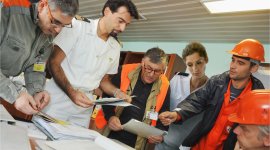Development and management of inspection systems of labour conditions on board fishing vessels

Photo © AdobeStock
Development and management of inspection systems of labour conditions on board fishing vessels
19 octobre–27 novembre 2026
Le cours est disponible en English
Présentation du cours
This course strengthens the capacity of all parties involved in fishing to promote decent working conditions through effective and coordinated inspection systems.
Groupes cibles
- Flag State and Port States officials, directors, managers and inspectors of competent authorities responsible for regulating and inspecting labour conditions on board commercial fishing vessels and enforcing international labour standards for decent work in fishing. - Trainers of inspectors. - Representatives of fishing vessel owners' and fishers' organizations, as well as representatives of NGOs involved in the protection of fishers' rights can also benefit from the course.
What will I gain from the course?
- Understanding of the international framework regulating work in fishing and, in particular, of the scope and content of the Work in Fishing Convention, 2007 (No. 188).
- Capacity to identify the challenges of effective and coordinated inspection systems.
- Ability to prioritize target vessels (as workplaces), vulnerable groups of fishers.
- Capacity to identify the labour issues to be inspected.
- Capability to develop policies, procedures and tools for inspecting labour conditions on fishing vessels.
- Ability to organize the resources of the inspection services.
- Capability to advise fishing vessel owners, skippers, and – in particular – fishers and workers’ organizations as well as other relevant stakeholders on the best way to comply with the labour regulations and promote decent working and living conditions on fishing vessels.
- Knowledge of tools to promote decent working and living conditions in fishing.
What topics does the course cover?
- The international regulatory framework for work in fishing: inspection and enforcement challenges; the Work in Fishing Convention, 2007 (No. 188), with focus on definitions, scope of application and competent authorities.
- Planning and managing of inspection systems: risk analysis, strategic and inspection planning, coordination among agencies, establishing complaint procedures; reporting and data, role of Port States, training of inspectors.
- What is to be inspected: roles and responsibilities, valid documents, crew list, fisher’s work agreement, manning, hours of rest, medical certificates and care, occupational safety and health, food and water, accommodation, payment of fishers, minimum age, recruitment and repatriation, complaint mechanisms.
- Promoting, respecting and realizing fundamental principles and rights at work in the fishing sector.
- Tools for mapping the fishing sector.
How is the course organized?
- Knowledge assessment at the start and at the end of the learning journey.
- Flexible and interactive self-guided sessions, combined with live sessions via Zoom.
- Weekly multiple-choice quizzes.
- A discussion forum where to engage in conversations about specific topics.


